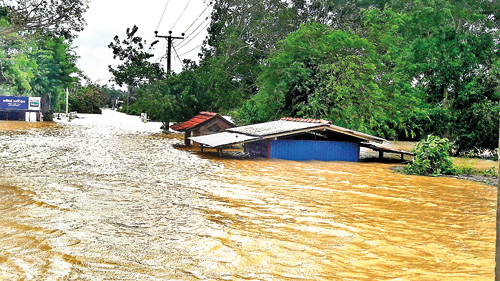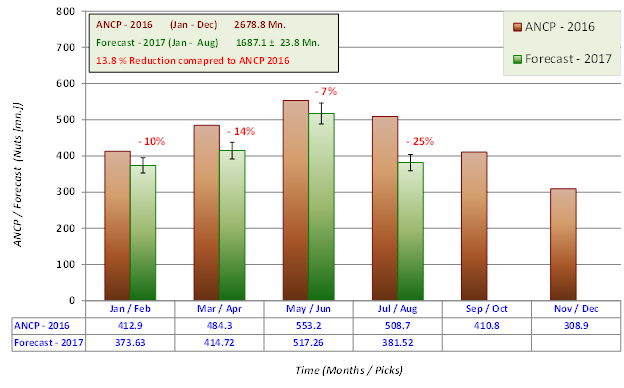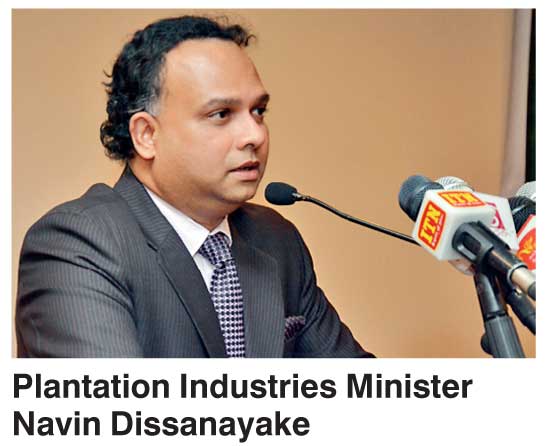
Tea workers’ salaries are revised once in two years. The two-year Collective Agreement (CA) between Regional Plantation Companies (RPCs) and trade unions was to be renewed on October 15, 2018. The new agreement which was signed almost two weeks ago was not published as usual. Trade unions are critisising the RPCs for depriving the tea workers of the attendance bonus and some other incentives when administering a so-called increase in the basic salary. The gazetting of the CA follows months of stalled negotiations.
- Estate workers betrayed after a long struggle
- Gazzette of CA still on hold

New agreement an eyewash
The 1000 Movement is a collective of unions and grassroots activists who are keen on increasing the daily basic salary of an estate worker to Rs. 1,000. Duminda Nagamuwa of the 1000 Movement said that there is no such increment provided in the newly-signed agreement.
RPCs refused to accede to the tea workers’ thousand rupee wage increase demand and signed the Collective Agreement recently which saw the basic wage being increased from Rs.500 to Rs. 700.

They have made the basic salary Rs. 700, removing the attendance and productivity allowances. So, essentially the daily net salary hike has been Rs. 20. This is just an eye wash Duminda Nagamuwa,The 1000 Movement
According to the 2016 CA the basic salary of a plantation worker was increased to Rs. 500. Rs 60 a day was given as an attendance allowance, Rs 30 as a price share supplement and Rs 140 as a productivity allowance. So, altogether the daily wage of a worker came to about Rs 730.
As per the new agreement, a worker gets a daily wage of Rs. 750 with a fixed share supplement of Rs. 50; which was Rs. 30 earlier. The other two key allowances including attendance allowance of Rs. 60 and Productivity Incentive of Rs. 140 were terminated.
“Now they have made the basic salary Rs. 700, removing the attendance and productivity allowances. They have increased the price share supplement to Rs. 50 from Rs. 30, making the new overall daily wage Rs. 750. So, essentially the daily net salary hike has been just Rs. 20. This is just an eye wash,” Nagamuwa complained.

Government’s responsibility
The meeting initially scheduled to be held on February 5 (Tuesday) with Tamil Progressive Front (TPF), RPCs, Plantations Ministry and Labour Ministry to come to a settlement regarding the salary increase of tea estate workers had been postponed, State Minister and TPF representative V.Radhakrishnan said.
Speaking to the Daily Mirror, he said the officials of the RPCs had not confirmed their participation at the meeting. The TPF politicians including ministers Mano Ganesan, V.Radhakrishnan and P.Thigambaram are insisting on crediting the productivity allowance of Rs.140 to the basic salary.

If the plantation companies don’t agree with our demand, we need the government to intervene and contribute to the salaries of the workers. That is when we will decide whether to stay in the unity government or quit State Minister V. Radhakrishnan
As a result of their objection, Prime Minister Ranil Wickremesinghe had agreed to delay the issuing of the gazette notification pertaining to increasing the daily wage of estate workers up to Rs.700. This was to allow negotiations to continue regarding the issue until a solution is found.
“If the plantation companies don’t agree with our demand, we need the government to intervene and contribute to the salaries of the workers. That is when we will decide whether to stay in the unity government or quit. The government also has a responsibility,” State Minister Radhakrishnan said.
Trade unions and their genuine purposes
There are around five main trade unions operating in the estates including Lanka Jathika Estate Workers Union (LJEWU) and the Ceylon Workers’ Congress (CWC). These labour unions are closely aligned with political parties. At a time when the expenditure for food, health, education, transport and clothes questions whether the basic needs of estate workers are fulfilled, compared to other ordinary workers, every tea estate worker is supposed to pay Rs.150 per month as the contribution to the trade union the individual holds membership with. Even the Ceylon Teachers’ Union, one of the main trade unions in the country, charges only Rs.20 per month from every member.

Nagamuwa of the 1000 Movement said it is ridiculous as to how the so-called trade unions first give the consent to the agreement which was signed in their presence and later pose objections to the same agreement. He opines that the issue is nothing, but a political agenda.
“How unfair and inhumane it is to snatch such an amount of money from salaries of tea workers and not do anything for their betterment? Ministers Thigambaram and Mano Ganesan opposed this newly signed agreement not with the genuine sympathy for tea workers. It was because they thought they could gain political mileage out of this. As they have always been, they are just using the issues of their community for political gains. It is a betrayal of a long struggle,” Nagamuwa said.

‘Govt. Can’t tell us what to pay and how to pay’
“With our new productivity based wage model, workers earn as much as Rs.80.000 per month if they work harder,” said Employers’ Federation of Ceylon Plantations Group Chairman Roshan Rajadurai.
“There are many families that have more than one source of income and enjoy a monthly income that exceeds the minimum wage of a tea estate worker. They earn a considerable amount of money to support their daily expenditure through other income sources. For example, men in the estate sector work as construction workers, three wheeler drivers and labourers in road construction.

The Government does not provide everything for these workers. If they are paying the salaries of tea workers, they can tell and do what they want. We are the responsible party regarding the wages of the workers EFC Plantation Services Group Chairman Roshan Rajadurai

“The Government does not provide everything for these workers. If they are paying the salaries of tea workers, they can tell and do what they want. We are the responsible party regarding the wages of the workers, therefore the Government cannot tell us what to pay and how to pay.
“If they really want to intervene, they can easily be a part of it and pay the workers. I don’t think the Government is in a position to do so because they are not even able to pay the EPF of the workers,” he said.
Is Sri Lankan tea running down in int’l market?
Tea is the second most excessively consumed beverage in the world. However, planters claim that the Sri Lankan tea industry is experiencing a difficult phase in the international market. Rajadurai told the Daily Mirror that their plantation companies are running down.
“We cannot financially afford to fulfill their demand for a daily wage of 1000 at this moment. We can afford to pay the salaries from what we earn. Our companies are running down in the market. The competition in the international tea market is high. Comparing with the tea workers in other countries, we have not even achieved 10% of their level of productivity. These happenings have made an already bad situation worse. The international prices are falling,” he said.
Despite him claiming that tea prices are falling, Colombo Tea Auction prices are not falling, but have been rising. The following table shows the tea average prices during every two years between 2012 and 2018.

despite there being competition in the international market, Sri Lankan tea is not affected which is why tea prices have gone up without facing a threat at the moment Tea Board Chairman Lucille Wijewardena
The Daily Mirror also spoke to the Sri Lanka Tea Board Chairman Lucille Wijewardena to inquire about the current situation of Sri Lankan Tea in the international market.
Wijewardena refuted Rajadurai’s statement that tea prices are falling. “despite there being competition in the international market, Sri Lankan tea is not affected which is why tea prices have gone up without facing a threat at the moment,” he said.






 File Photo of farmers planting paddy in waterlogged fields. It has been decided to have an on-line Database System for Paddy/Rice stocks which could then be accessed easily by any official/or member of the public at any time, according to the Prime Minister’s office.
File Photo of farmers planting paddy in waterlogged fields. It has been decided to have an on-line Database System for Paddy/Rice stocks which could then be accessed easily by any official/or member of the public at any time, according to the Prime Minister’s office.

